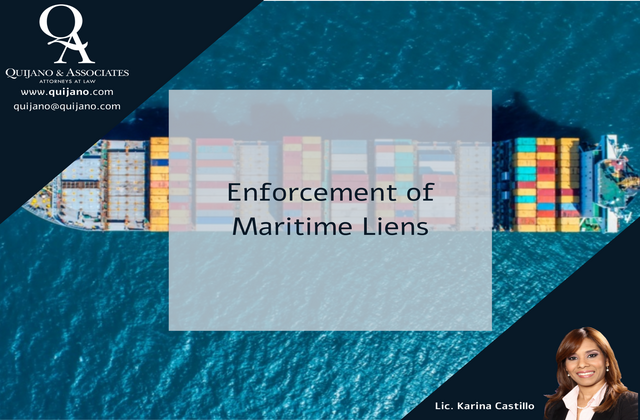Enforcement of Maritime Liens

I. Background:
By means of the enactment of Law No. 8 of March 30, 1982, the Maritime Courts were created, a law that was subsequently modified, added and suppressed by the Laws 11 of May 23, 1986 and Law 12 of January 23, 2009.
This law states that maritime justice in the first instance shall be exercised by the Maritime Courts and in second instance, by the Maritime Appeals Court, both with jurisdiction in the territory of the Republic of Panama. However, maritime disputes may be submitted to arbitral jurisdiction.
Pursuant to article 19 of the referred legal excerpt, the Maritime Courts shall have exclusive jurisdiction, in cases arising from acts regarding maritime commerce, transportation and traffic, occurring within the territory of the Republic of Panama, in its territorial sea, the navigable waters of its rivers, lakes and in those of the Panama Canal.
The Maritime Courts shall also have exclusive jurisdiction to hear actions arising from the acts referred to in the abovementioned item, occurring outside the area indicated in the abovementioned paragraph, in the following cases:
1. When the respective actions are directed against the vessel or its owner and the vessel is arrested within the jurisdiction of the Republic of Panama as a consequence of such actions.
2. When the Maritime Court has arrested other property belonging to the defendant, even though the latter is not domiciled within the Territory of the Republic of Panama.
3. When the defendant is within the jurisdiction of the Republic of Panama and has been personally notified of any actions filed in the Maritime Courts.
4. When one of the vessels involved is with Panamanian flag, or the Panamanian substantive law is applicable by virtue of the contract or the provisions of Panamanian law, or the parties expressly or tacitly submit to the jurisdiction of the Maritime Courts of the Republic of Panama.
II. Enforcement of maritime liens:
This action shall fall specifically against the vessel, the cargo, the freight or the combination thereof, in accordance with the provisions of Article 530 of the aforementioned regulations.
The lawsuit must contain in addition to the provisions of Article 58 of Law 8, 1982 the following:
1. The libel must indicate that it is an action for the execution of maritime liens credits;
2. The description of the vessel, cargo or freight subject to the obligations, and amount of the claim must be indicated, stating whether they are, or will soon be, within the court jurisdiction;
3. The request for the arrest of the goods subject of the maritime liens credit.
Once the lawsuit has been filed and admitted, and the arrest of the property or assets assign to the maritime lien sued has been constituted, the proceeding shall continue in accordance with the rules governing the ordinary procedure established in this Law.
As it is well indicated, in the case of an execution of a maritime lien credit, the personal notice of the lawsuit will have the effect of granting a term of thirty (30) days to the defendant to answer, counterclaim and/or file exceptions.
Once this term has elapsed and the preliminary claims have been resolved, a preliminary hearing will be held in order to:
1. To urge the parties to admit facts and documents that make the practice of certain evidence necessary.
2. To determine the controversial items based on the facts of the lawsuit, the answer, the evidence and the applicable law and the facts and documents accepted by the parties during the preliminary hearing.
3. To decide the applicable substantive law when this is disputed by the defendant.
4. To limit the number of surveyors and the items on which the opinions will be based.
5. To set the date and time for the parties, accompanied by their witnesses and surveyors, to appear in an ordinary hearing.
6. Determine other matters whose consideration may contribute to expedite the processing of the proceeding, such as the resolution of motions concerning evidence.
At the conclusion of the reception of evidence, which may be submitted twenty (20) days prior to the date of the ordinary hearing, and of rebuttal evidence, which may be submitted five days prior to the date of the ordinary hearing, the Judge will request the intervening parties to submit their pleadings.
When this stage finished, the court judgment will be issued either at the end of the submission of the pleadings or within sixty days following the presentation of the pleadings.
III. Arrest:
In accordance with the provisions of Chapter VI, Precautionary Measures, the arrest shall have the following purpose:
1. To prevent the process from being illusory in its effects and to prevent the defendant from transposing, alienating, impairing, encumbering, encumbering or dissipating assets subject to such measure.
2. To provide to the jurisdiction of the Panamanian Maritime Courts the knowledge of the causes that arise within or outside the territory of Panama, as a consequence of facts or acts related to navigation, when the defendant is outside its jurisdiction.
3. To materially seize property subject to arrest in order to enforce the maritime lien credit.
With the request for arrest, a surety bond in the amount of US$1,000.00 must be filed to cover the damages that may be caused by the arrest, in addition to an initial advance payment in favor of the court bailiff not exceeding US$2,500.00 for the maintenance and custody of the arrested property, and if the arrested property is a vessel, the advance payment to the judge shall be US$2,500.00. The bailiff may require additional advances.
If the petition for arrest is for the sole purpose of securing the results of the proceeding, the amount of the bond shall be fixed by the Court, as the case may be, and shall not be less than 20%, nor more than 30% of the amount of the lawsuit.
IV. Appeal before the Maritime Appeals Court:
Maritime trials shall be of dual instance and shall admit the appeal before the Maritime Appeals Court, pursuant to the provisions of the Law in reference.
Once the party supports in writing the appeal and its opposition, the Maritime Appeals Court shall convene the parties to a hearing in order to receive an oral argument from them with the purpose of ruling in accordance with the parameters established in the Law.
Panama being a maritime convergence center, with more than 100 years providing vessels registration, puts us in an advantageous position since the maritime sector contributes to the country’s economy by contributing 20% of the GDP.
By virtue of this, maritime litigation arises, and with our Litigation and Arbitration Department we are in the position to provide legal support to our local and international clients in any situation arising from this sector.




